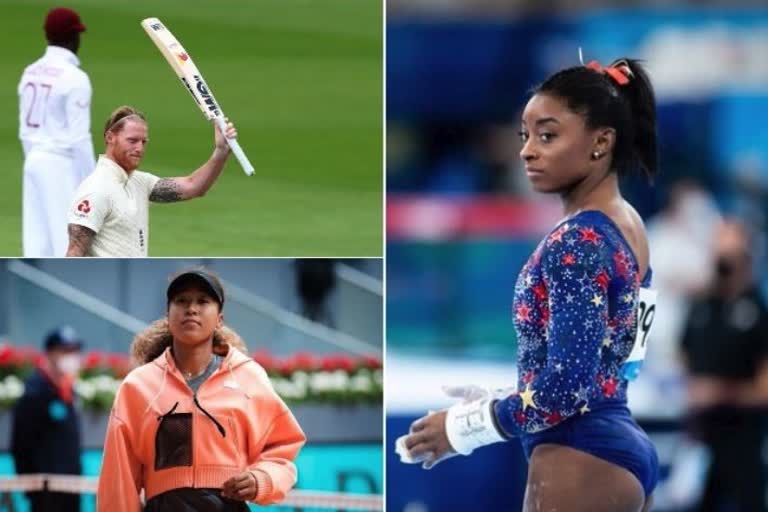Hyderabad: On 24th May in 2002, when Spiderman hit the theatres and Peter Parker, in the first hour of the movie was still figuring his powers gained by a genetically altered spider, his uncle, Ben Parker, just before his death by a street crook, had told him: With great powers, comes great responsibility.
The aphorism gradually gained significance in real-life situations with courts and establishments often quoting it while pronouncing judgements and serving reminders of the significance and responsibilities of those in power and authority.
Almost two decades later, when the world struggled to cope with the pandemic with people being tethered to their rooms in bubbles and other forms of isolation, concerns relating to mental health started gaining voice.
Last year, a few big names from the field of sports openly came out prioritising mental health over profession despite the fear of backlash for being "weak", and altered the discourse completely.
Players in the sports arena are often expected to be "mentally strong" and not show emotions, a classic case of which could be found in the portrayal of former India captain MS Dhoni, who has earned praise for not showing emotions and is famous for being "Captain Cool".
Read: KL Rahul gains 18 places in ICC Test rankings; Shami, Bumrah too move up
How the shift happened?
When the world's best athlete Michael Phelps with a record 23 gold medals opened up about his struggles with depression in 2012 and that he even contemplated suicide at one point, he threw the discussion wide open.
"I can go back to 2004 and say that was when I first experienced it. That was the first time I came across depression coming back from the 2004 Olympic Games. I suffered from post-Olympic depression pretty bad," Phelps had told a website back then.
Another major shift happened with Naomi Osaka pulling out of the French Open last year due to mental health concerns. Her withdrawal was later followed by one of the biggest names in sports history -- Simone Biles. Biles opted out of the Tokyo Olympics citing mental health concerns.
"Whenever you get in a high-stress situation, you kind of freak out. I have to focus on my mental health and not jeopardize my health and well-being," she had told CNN.
The tides appeared to be turning with multiple players recounting their stories and the world by then had understood that mental health is real and applauded her decision.
Delhi based Sport & Performance Psychologist Nanaki J. Chadha agrees that a paradigm shift is happening in the attitude of people, praising athletes for coming out in the open and crediting them for stirring up conversations around mental health.
"For prominent athletes like Simone Biles, Virat Kohli and others to speak about mental health has been of utmost importance. More and more athletes are now recognising and understanding the importance of mental health more than ever before, and even organisations are starting to see its significance," Nanaki told Etv Bharat.
According to the latest data provided by the National Crime Records Bureau (NCRB), a staggering 1,53,052 people in India died by suicide in 2020, a rise of 10 per cent from its previous year. However, no data is available to establish how many of them suffered from depression or other mental health problems.
Read: Australia cricketer Maxwell tests positive for COVID-19
Anxiety and depression have not even spared young people. A UNICEF report said that at least 13% of people between the ages of 10 and 19 live with a diagnosed mental health disorder.
And sportspersons are no immune to it as it demands perfection with a constant emphasis on 'winning at all costs' from early days which can be draining for athletes and result in negative emotions and maladaptive behaviours.
"Imagine a tube-light or a fan being switched on constantly, it would burn out, right? That’s what happens when a sportsperson is constantly having to push with no or little amounts of rest and break," Keerthana Swaminathan, who works as a Sports & Performance Psychologist in Chennai, told this website.
"At a very early age, these young athletes are being constantly asked to focus only on winning. Instead, if they can focus on growing or developing as an athlete (which will certainly involve making mistakes and probably even "failing"), it will definitely help," she said.
Keerthana also feels that constant media scrutiny can be devastating for players who already have to deal with the pressures of the game.
"Media is very powerful and more than the scrutiny of media, it’s the way the societal mindset or perception about the person changes because of what they read or see. So, that can be very pressurising, because people end up treating you differently."
What can be done?
Despite players and other celebrities coming out in the open, mental health still remains a topic that is brushed under the carpet or spoken in whispers due to the stigma attached to it that hinders open conversations to take place, especially in India.
According to Nanaki, sports psychologists should be made a part of the set-up to help players mentally prepare for the demanding nature of competition.
"We also need to build a psychologically safe, secure, and supportive environment around them and include qualified sport psychology professionals to their multidisciplinary teams to address mental health of athletes," she said.
But conceded that awareness around mental health must be the first priority.
With 2021 witnessing celebrities from Bollywood and sports coming out and showing support, the world seems to be heading in the right direction at the moment and as we march into a fresh year, we must remember what Biles taught us back in 2021: "It's Ok to not be Ok".



